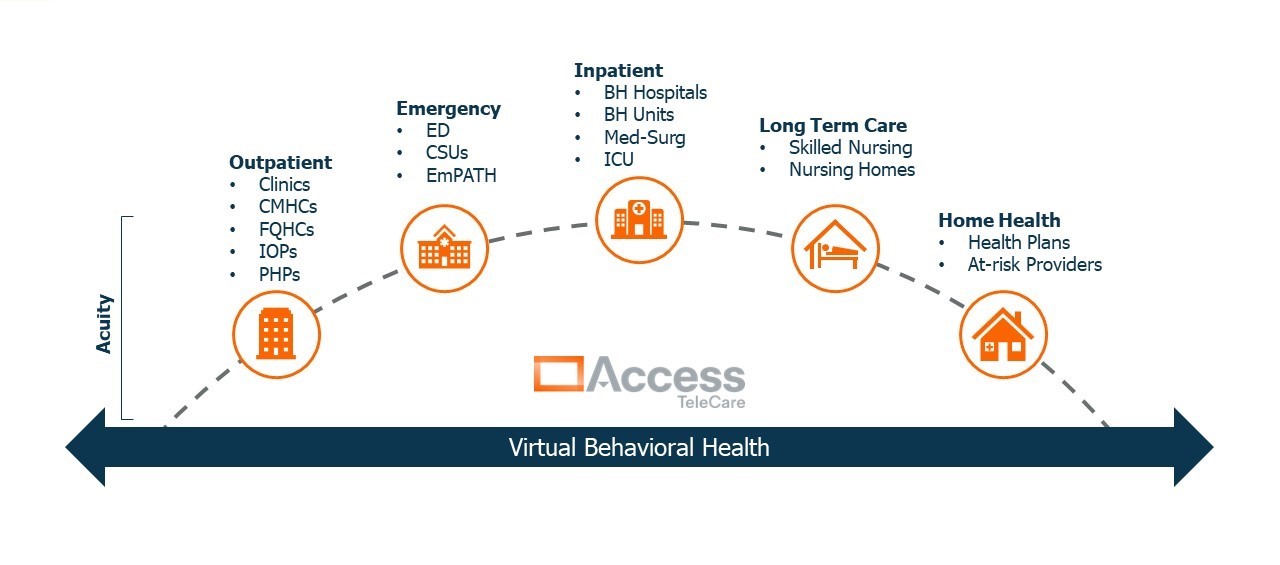Hospitals have invested significantly in people, processes, and policies to reduce preventable readmissions. Yet, readmissions of patients with behavioral health conditions remain stubbornly high, in large part due to factors not entirely within a hospital’s control. In previous blogs, we’ve addressed the way in which telemedicine can disrupt the readmission cycle by reducing unnecessary transfers, but in this blog, we’ll dive into how teleBehavioral health programs can address the revolving door of readmissions.
Access to timely outpatient follow-up and medication management and the presence of co-morbid substance use disorders are contributing factors to the 30-day readmission rates of more than 22 percent for patients with schizophrenia and 15 percent for patients with mood disorders.
At the same time, repeat use of the emergency department by patients experiencing behavioral health crises is contributing to extensive boarding times, emergency department overcrowding, decreased patient satisfaction, increased numbers of patients leaving without being seen, increased staff burnout, and avoidable health care costs. While hospital ED “super utilizers” are not limited to patients with behavioral health needs, mental health visits constitute a greater share of ED visits among super utilizers than among other patients with other needs, regardless of insurance coverage or payer type.
Solving the twin challenges of readmissions and ED super utilization requires a holistic approach, and one tactic is unlikely to eliminate the challenge altogether. Nonetheless, with a behavioral health partner that can manage and follow a behavioral health patient from the emergency department to inpatient setting to step-down services to outpatient care, hospitals have the opportunity to significantly reverse the data trend.

Access TeleCare’s virtual behavioral health service offers every hospital partner we work with a dedicated pod of psychiatrists and psychiatric mental health nurse practitioners that can see patients wherever they are to maintain consistency of care across the entire continuum.
The Benefits of Continuity of Care for Patients with Behavioral Health Needs
For both acute care hospitals and behavioral health hospitals, continuity and consistency of care for patients with behavioral health needs:
“Hospitals are the epicenter for the nation’s behavioral health crisis, but with our integrated virtual behavioral health solution, they have the resources and flexibility needed to treat, follow, and manage patients across the continuum so the front door of the ED doesn’t keep revolving.”
– Sandeep Bidari
President, Behavioral Health Business Unit, Access TeleCare
With a more than 20-year history of serving as hospitals’ partner in developing and deploying care solutions that meet their and their patients’ needs, Access TeleCare delivers at a scale that no other telemedicine provider can. Access TeleCare’s physician-led and clinically driven approach to telemedicine means hospitals don’t have to choose between personalized attention and collaboration or a telemedicine solution with the resources to fully meet their patients’ care needs.
Every Access TeleCare program comes equipped with collaborative and engaged clinicians who act as full members of on-site care teams, delivering excellent care and support for all aspects of patient care. Our partner hospitals also gain access to our extensive support network that provides 24/7 support and guidance for every facet of hospital operations, including scheduling, technical support, and quality improvement.
Contact us to start talking about how we can work together for your behavioral health patients.









